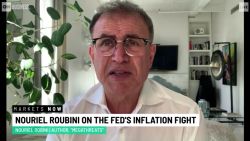A version of this story first appeared in CNN Business’ Before the Bell newsletter. Not a subscriber? You can sign up right here. You can listen to an audio version of the newsletter by clicking the same link.
When the coronavirus pandemic swept across the world in 2020, investors responded by pouring money into companies that would benefit from people spending much more time at home.
Netflix (NFLX) and Peloton were two of the biggest pandemic winners, along with video call provider Zoom Video (ZM) and electronic signature firm DocuSign (DOCU).
Now, the pandemic boom is over.
Netflix and Peloton lost roughly a fifth of their market value on Thursday after both companies disappointed investors.
Netflix said in an earnings report that it added fewer subscribers than expected during the fourth quarter. Even more worrying, the streaming giant predicted that it would add just 2.5 million subscribers in the first three months of 2022, compared to 4 million in the same period last year.
Alarm bells: Netflix acknowledged in a letter to investors that competition from streaming rivals “may be affecting our marginal growth some.”
Netflix recorded a $607 million profit in the fourth quarter, and revenue increased 15% to $7.7 billion. But investors are focused on how quickly the company is growing, and they don’t like what they see — shares are down roughly 20% in premarket trade.
The situation at Peloton is more dire.
CEO John Foley acknowledged Thursday that Peloton is “considering all options” — including layoffs and production curbs — but denied a report that it would temporarily halt production of bikes and treadmills.
The statement came hours after CNBC reported that Peloton plans to pause production of its $1,495 lower-end bike for two months, and stop making Tread machines for six weeks, citing internal documents.
Foley did say that the company is “right-sizing” production in response to “seasonal demand curves,” and he alluded to potential job cuts.
“In the past, we’ve said layoffs would be the absolute last lever we would ever hope to pull,” he said. “However, we now need to evaluate our organization structure and size of our team, with the utmost care and compassion.”
Peloton shares sank nearly 24% on Thursday.
Quick rewind: Both stocks had banner years in 2020. Shares in Netflix increased 67% that year, while Peloton gained an astonishing 434%.
Peloton shares lost momentum in 2021, while Netflix powered ahead. What unites the companies now is that both are struggling to find new customers as life gradually returns to normal — and investors have little sympathy.
They are not alone. Shares in pandemic darling DocuSign are down 57% over the past six months. Zoom Video has shed 54% over the same period.
Netflix is likely to be the most resilient of the bunch. The company has a huge head start in the streaming wars, and a proven track record of delivering for investors. Its shares are still up over 250% over the past five years.
Gas prices could soar if Russia invades Ukraine
If Russia invades Ukraine, inflation-weary Americans could face even higher prices at the pump, reports my CNN Business colleague Matt Egan.
The situation: Russia has amassed roughly 100,000 troops at the Ukrainian border, even as the Kremlin denies it is planning to attack. Oil prices have already shot up to seven-year highs.
Russia is the world’s No. 2 oil producer, behind only the United States. Ukraine is a key energy transit hub, and a large amount of Russian natural gas exports flow through the country on their way to Europe.
The response: An invasion of Ukraine could trigger sanctions from Washington on Russia’s vast energy resources, damage to the region’s energy infrastructure and raise the specter of Russian President Vladimir Putin further weaponizing exports of natural gas and crude oil.
Investors would buy first and ask questions later.
“There is a very good chance we would reach $100 [per barrel]. That’s going to be inflationary with an exclamation point,” said Robert Yawger, director of energy futures at Mizuho Securities. “We don’t need that at all. We can’t afford that at all.”
A conflict between Russia and Ukraine would boost gas prices, the head of the International Energy Agency said on Thursday.
“Such a huge geopolitical event would [have] major implications on the gas prices, if not leading to turmoil,” IEA Executive Director Fatih Birol told CNNI’s Julia Chatterley on First Move.
Gasoline prices, which move with a lag to oil, have already started to creep higher in recent days. The national average hit $3.32 a gallon on Wednesday, up from the recent low of $3.28, according to AAA.
Oil prices are up sharply this week and analysts say concerns about a Russia-Ukraine conflict have contributed to those gains.
“The market has been really slow to appreciate the risks of an invasion,” said Helima Croft, head of global commodity strategy at RBC Capital Markets. “Putin is not really a bluffer. He’s known for backing words with action.”
Home prices shatter records
The US real estate market was on fire last year, reports my CNN Business colleague Anna Bahney.
The median home sales price was $346,900 in 2021, up 16.9% from 2020, and the highest on record going back to 1999, according to the National Association of Realtors. Home sales had the strongest year since 2006, with 6.12 million homes sold, up 8.5% from the year before.
While that was bad news for would be buyers, it was a boon for those who already owned a home. A typical homeowner accumulated $50,200 in housing wealth, looking at the median price from 2020 to 2021.
“That is a sizable wealth gain for homeowners across the country,” said Lawrence Yun, NAR’s chief economist. “The housing market has seen a spectacular performance this last year with sales rising and prices rising. But inventory is at an all-time low.”
What’s driving the market: By the end of 2021, there were fewer homes for sale than ever. The inventory of unsold existing homes fell to a record low of 910,000 at the end of December. That’s a 1.8-month supply of homes at the current pace, also an all-time low.
Up next: Yun anticipates total home sales to drop a bit in 2022 as mortgage rates tick up. But he added that employment gains, stricter underwriting standards and continued demand are strong indications that the market is not in danger of crashing.
“Consumers should prepare to endure some increases in mortgage rates,” Yun cautioned. “I also expect home prices to grow more moderately by 3% to 5% in 2022, and then similarly in 2023 as more supply reaches the market.”
Up next
Ally Financial and Schlumberger report earnings before the opening bell.
Coming next week: Earnings season continues with reports from IBM, American Express, Johnson & Johnson, Microsoft, Boeing, Intel, Tesla, Apple and many more.
The Fed announces its next policy decision on Wednesday. In Thursday’s Before the Bell, we got ahead of ourselves and said the central bank is expected to hike interest rates. In fact, rates are expected to go up in March.
–Hey, Peloton owners: Are you still using your Bike or Tread? Tell us why or why not. And if the answer is no, do you plan to sell it? Please email your response to parija.bhatnagar@warnermedia.com.





















